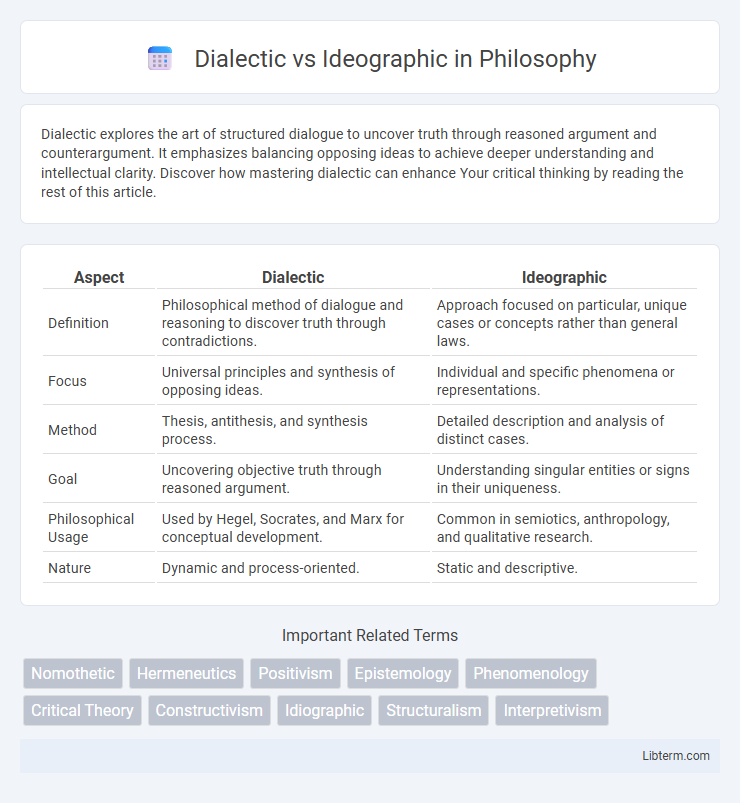Dialectic explores the art of structured dialogue to uncover truth through reasoned argument and counterargument. It emphasizes balancing opposing ideas to achieve deeper understanding and intellectual clarity. Discover how mastering dialectic can enhance Your critical thinking by reading the rest of this article.
Table of Comparison
| Aspect | Dialectic | Ideographic |
|---|---|---|
| Definition | Philosophical method of dialogue and reasoning to discover truth through contradictions. | Approach focused on particular, unique cases or concepts rather than general laws. |
| Focus | Universal principles and synthesis of opposing ideas. | Individual and specific phenomena or representations. |
| Method | Thesis, antithesis, and synthesis process. | Detailed description and analysis of distinct cases. |
| Goal | Uncovering objective truth through reasoned argument. | Understanding singular entities or signs in their uniqueness. |
| Philosophical Usage | Used by Hegel, Socrates, and Marx for conceptual development. | Common in semiotics, anthropology, and qualitative research. |
| Nature | Dynamic and process-oriented. | Static and descriptive. |
Understanding the Dialectic Approach
The dialectic approach emphasizes understanding concepts through the interaction of opposing ideas, fostering critical thinking and synthesis of knowledge. It contrasts with the ideographic method, which centers on detailed analysis of individual cases or examples. Mastery of the dialectic process enhances reasoning skills by encouraging continuous dialogue and the resolution of contradictions.
Defining Ideographic Methodology
The ideographic methodology emphasizes the detailed and in-depth study of individual cases or events to understand unique cultural, historical, or social phenomena. This approach prioritizes qualitative data, rich descriptions, and context-specific insights over broad generalizations or universal laws. It contrasts with dialectic methods by focusing on particularities and subjective meanings rather than on binary oppositions or dialogic processes.
Key Differences: Dialectic vs Ideographic
Dialectic refers to a method of reasoning that emphasizes dialogue, contradiction, and the synthesis of opposing ideas to arrive at truth, commonly used in philosophy and logic. Ideographic pertains to symbolic representation of ideas or concepts through signs or characters, often seen in writing systems such as Chinese characters, where each symbol conveys a specific meaning independently. The key difference lies in dialectic's focus on dynamic reasoning processes, while ideographic centers on static symbolic representation of information.
Historical Origins of Dialectic Thought
Dialectic thought traces back to ancient Greece, particularly in the works of Socrates, Plato, and Aristotle, who emphasized structured dialogue and reasoning to uncover truth. This method contrasts with ideographic approaches, which focus on individual symbols or representations to convey meaning, originating largely from the development of written characters in early civilizations like Mesopotamia and China. The historical origins of dialectic highlight its role in Western philosophy as a dynamic process of thesis, antithesis, and synthesis that shaped critical thinking and logical analysis.
Evolution of Ideographic Analysis
Ideographic analysis has evolved to deeply interpret individual cases by emphasizing unique, context-specific data rather than generalized principles, contrasting with the dialectic method's focus on opposing ideas to reach synthesis. Advances in qualitative research and cognitive psychology have enhanced ideographic approaches, allowing for richer, more nuanced understandings of personal experiences, behaviors, and cultural contexts. This evolution positions ideographic analysis as a powerful tool in disciplines like psychotherapy, anthropology, and personalized education, where detailed, individualized insights drive practical outcomes.
Strengths of the Dialectic Perspective
The dialectic perspective excels in fostering critical thinking and synthesizing diverse viewpoints, enabling deeper understanding of complex issues by exploring contradictions and oppositions. It promotes dynamic problem-solving through continuous dialogue and refinement of ideas, which leads to more comprehensive and adaptable conclusions. This approach effectively uncovers underlying assumptions and enhances the capacity to resolve conflicts by integrating multiple perspectives into coherent frameworks.
Advantages of the Ideographic Approach
The ideographic approach offers the advantage of deeply capturing individual experiences and unique cultural contexts, enabling richer qualitative analysis compared to the generalized patterns emphasized in dialectic methods. This approach supports nuanced understanding in fields like anthropology, psychology, and linguistics by prioritizing specific case studies and detailed descriptions. Its focus on particularities allows researchers to uncover subtle complexities and variations that broad dialectic frameworks might overlook.
Dialectic and Ideographic in Modern Research
Dialectic and ideographic approaches represent two contrasting methodologies in modern research, with dialectic emphasizing the structured exchange of arguments to uncover truth through contradiction and synthesis. Ideographic research prioritizes detailed, context-specific understanding by focusing on unique cases or phenomena, often used in qualitative studies such as ethnography or case studies. Current research trends integrate dialectic reasoning to frame hypotheses and debates while employing ideographic methods to provide depth and nuance to data interpretation.
Practical Applications Across Disciplines
Dialectic methods emphasize structured argumentation and critical thinking, making them essential in law, philosophy, and debate for resolving conflicts and developing theories. Ideographic approaches, prioritizing detailed case studies and unique individual data, are fundamental in anthropology, history, and psychology to understand cultural or personal nuances. Practical applications combine dialectic reasoning to challenge hypotheses with ideographic evidence collection to ground conclusions in real-world contexts.
Choosing Between Dialectic and Ideographic Models
Choosing between dialectic and ideographic models depends on the nature of the research question and data type. Dialectic models emphasize structured argumentation and synthesis of opposing ideas, making them suitable for analyzing dynamic processes and theoretical development. Ideographic models focus on detailed, case-specific insights, ideal for deep understanding of individual or unique phenomena in qualitative research.
Dialectic Infographic

 libterm.com
libterm.com